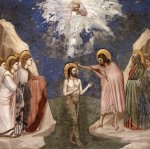Epiphany in Eastern Christianity Date in the current year: January 19, 2026
 The Eastern Orthodox Church and some Oriental Orthodox denominations still use the Julian calendar that falls 13 days behind the universally adopted Gregorian calendar, meaning that their fixed feasts are celebrated 13 days later than their Western counterparts. For example, Epiphany in Eastern Christianity falls on January 19 in the Gregorian calendar.
The Eastern Orthodox Church and some Oriental Orthodox denominations still use the Julian calendar that falls 13 days behind the universally adopted Gregorian calendar, meaning that their fixed feasts are celebrated 13 days later than their Western counterparts. For example, Epiphany in Eastern Christianity falls on January 19 in the Gregorian calendar.Epiphany, also known as Theophany, is one of the most important Christian feast days. It celebrates the revelation of God incarnate as Jesus Christ. In Western Christianity, Epiphany commemorates primarily the visit of the Three Kings to Baby Jesus, while Eastern Christians commemorate Jesus’s baptism by John the Baptist in the River Jordan. Both events are seen as Jesus Christ’s manifestation to the world as the Son of God.
In the Eastern Orthodox Church, Epiphany belongs to the so-called Twelve Great Feasts, which are the most significant feasts on the Orthodox liturgical calendar after Easter (Pascha). As it’s already been mentioned above, the feast marks the baptism of Jesus Christ and his revelation as the Messiah, therefore it is sometimes referred to as the Feast of the Baptism of the Lord. The baptism of Jesus marks one of the only two occasions when all three Persons of the Holy Trinity (God the Father, God the Son, and God the Holy Spirit) revealed themselves simultaneously to humanity.
The name of the feast as celebrated in the Eastern Orthodox Church may be rendered in English as Theophany rather than Epiphany. Although the names are considered synonymous, Epiphany is translated from Greek as “manifestation”, while Theophany has a more specific meaning, “divine manifestation”.
The most important ritual of Epiphany in Eastern Christianity is the Great Blessing of Waters. Holy water is blessed twice, first after the Divine Liturgy on the eve of the feast, and then on the morning of Epiphany. The ceremony involves Scripture readings and lengthy prayers. The priest makes the sign of the cross over the water, then immerses the hand cross into the water thrice, and blesses the congregation with the newly consecrated water.
According to Orthodox Christianity, the Great Blessing changes the nature of the water and imbues it with special powers. Holy water is believed to remain fresh for many years and cure physical and mental ailments. Many people bring it home and store it to use in the time of illness, to drink, or to bless their families and homes.
In many parishes, the second blessing of water is actually the blessing of a nearby body of water, be it a river, lake, harbor, or even swimming pool. In Russia and other countries where the winters are severe, a cross-shaped hole is cut into the ice so that the priest can dip the cross into the water.
After the blessing, some parishioners immerse themselves three times under the water. The ritual symbolizes washing away one’s sins and experiencing a spiritual rebirth, in a sense. The practice of bathing in the ice-cold blessed water is relatively new, it has flourished since the dissolution of the Soviet Union.
- Category
- Religious Holidays
- Tags
- theophany, epiphany, eastern orthodox church, baptism of christ, twelve great feasts, religious holidays